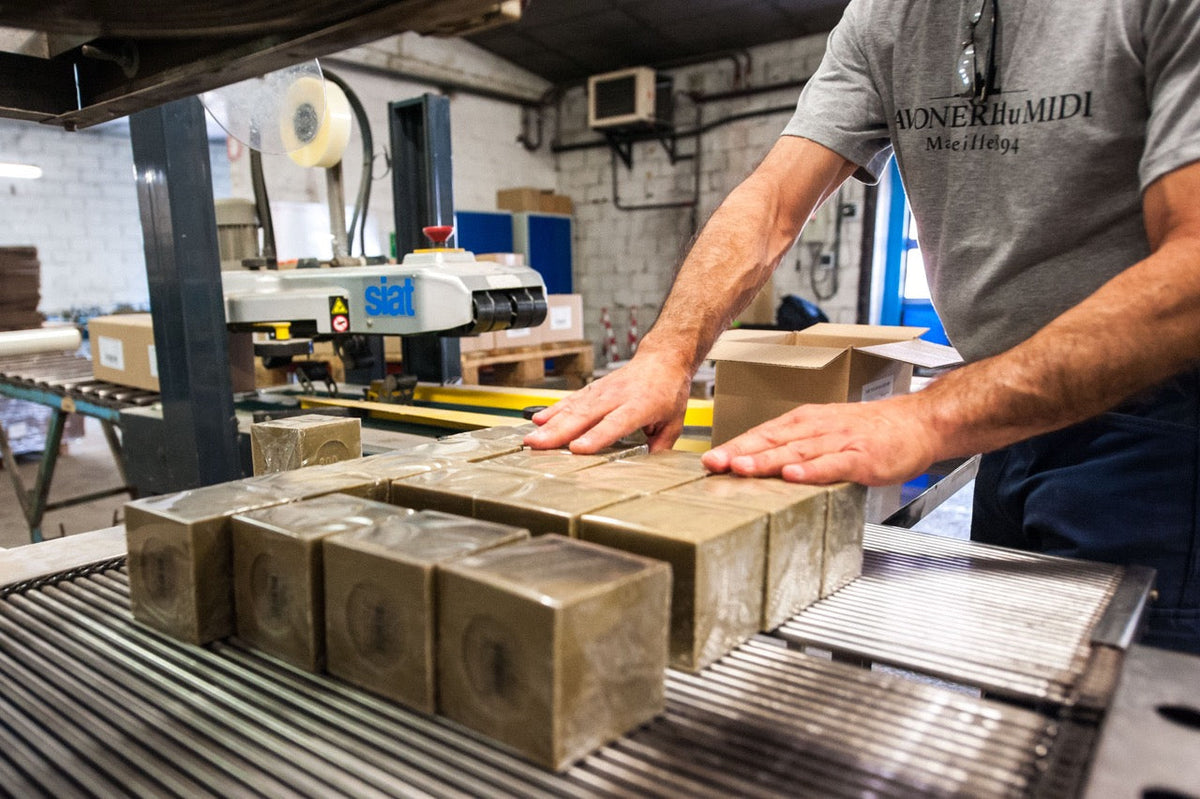

Gifting couldn't be easier
Add a gift message to be emailed to when their parcel arrives, or at a time of your choice.
From the fragrant hills of Provence to the workshops of Marseille, French soap holds a timeless place in the Heritage of France. Whether it’s the creamy lather of a goat’s milk bar or the iconic cube of Savon de Marseille, French soap has an unmistakable air of quality, history, and artisan craftsmanship.
But what exactly makes French soap unique — and how does it compare to soaps from other regions of the world? Let’s take a closer look at what sets French soaps apart and why they’ve earned such a loyal following around the globe.
French soap is more than a cleansing product — it’s a cultural artifact. The French have been refining soap-making since the Middle Ages, with Marseille becoming one of the soap capitals of the world by the 17th century.
In 1688, King Louis XIV issued the Edict of Colbert, regulating the production of Savon de Marseille and ensuring only pure olive oil and natural ingredients were used — no animal fats, no artificial perfumes. These standards shaped a legacy of soapmaking focused on natural purity, simplicity, and artisanal excellence.
French soap is most notable for its short, honest ingredient lists. Traditional bars use:
Olive oil, often locally sourced from Provence
Vegetable oils (such as coconut, sunflower, or palm from sustainable sources)
Natural clays and minerals for colour
Essential oils and botanical extracts for fragrance
This commitment to gentle, natural ingredients is a hallmark of French soapmaking. Many bars are suitable for sensitive skin, infants, and even household use (like Savon Noir and Savon de Marseille).
Compare that to many supermarket brands — often loaded with detergents, preservatives, and synthetic fragrances — and it’s easy to see why French soap earns such trust.
Hard, square cube or block
Made in large cauldrons using a traditional method
72% olive oil (or sometimes a mix with coconut oil)
Used for body, face, laundry, stain removal, even pets and dishes
Soft paste or liquid
Made with olive oil and potash
A traditional multi-surface cleaner and gentle exfoliant
Re-finding it's place in eco-conscious and budget conscious households
Often triple-milled for a luxurious finish
Blended with exceptional fragrance, normally from Grasse, or sourced locally from independent perfumiers.
Or enriched with lavender, verbena, rose, orange blossom, or milk
Rich in fatty acids, vitamins A and E
Ultra-gentle and hydrating
A favourite for dry, sensitive or eczema-prone skin
Let’s look at how French soap stacks up against other traditional soaps from around the globe:
Made with extra virgin olive oil, often unscented
Also very gentle and minimalist
Typically cast in smaller, softer bars that lather
Typically French Soap bars will last longer due to their process and formulations
Often includes laurel oil or black olive paste
Used in steam bath rituals, especially in hammams
Can be more oily or medicinal-smelling than French soap
Multipurpose and simliar to Savon de Marseille.
Often formulated with rice bran, charcoal, or camellia oil
Highly targeted for skincare (anti-aging, brightening, etc.)
Packaged in minimalist or beauty-style boxes
French soap leans more toward traditional luxury and heritage than modern cosmetic trends
Made with plantain ash, cocoa pods, and shea butter
Traditionally handmade and soft-textured
Excellent for acne and oily skin
French soap is usually more stable, less gritty, and broader in household use
Famous for their beautifully packaging
Rich in shea butter, almond oil, or honey
Highly perfumed, sometimes overly synthetic
French soaps are renowned for their quality of product and are frequently unwrapped
One major technical difference: triple-milling.
This process, perfected in France, involves passing the soap paste through stainless steel rollers three times, which:
Eliminates air pockets
Distributes fragrance evenly
Produces a smooth, hard bar that lasts significantly longer
Gives that unmistakably luxurious feel when lathering
Not all countries triple-mill their soaps — it’s a hallmark of French quality, particularly for perfumed and beauty soaps.
French soap has long embodied zero-waste values — long before it was trendy.
Plastic-free
Long-lasting (a 300g cube can last months)
Biodegradable
Vegan and cruelty-free (in most cases)
No microplastics, SLS, or parabens
Compare that to many modern body washes and “moisturising” bars, and French soap is clearly ahead in eco credentials.
Many French brands like Fer à Cheval, Bleu Jaune and Tadé, use recycled and recyclable packaging, local ingredients, and traditional methods using more 'now' solar or renewable energy. Products and packaging are mostly compostable and biodegradable.
Because of its natural, oil-rich composition, French soap tends to be:
Non-drying
Suitable for eczema, rosacea, and dermatitis-prone skin
Often unscented or lightly fragranced
Ideal for frequent handwashing, which can strip the skin with harsher products
In contrast, many commercial soaps and body washes contain detergents (like SLS or sulfates) which can disrupt the skin barrier.
Read more about this here and here.
You’ll want to look for reputable producers, preferably using traditional methods, such as:
La Corvette – Founded in 1894, still making cauldron-cooked Savon de Marseille in Marseille
Fer à Cheval – The oldest soap factory still in operation (since 1856)
Tadé Pays du Levant – Known for its beautifully packaged soaps and hammam accessories
French soap isn’t just about cleansing — it’s about culture, care, and craft. Rooted in centuries of tradition yet aligned with modern values of sustainability and skin sensitivity, it offers a product experience that’s as honest as it is luxurious.
While the world makes many beautiful soaps — and each has its story — French soap remains iconic for its balance of nature, history, elegance, and effectiveness and quickly becomes a way of life.
© French Soaps UK 2025
If you would like help shopping this article, or have further product or ingredient questions then please contact us and we will be happy to help. E. bonjour@frenchsoaps.co.uk T. 01423 803080
©️ French Soaps UK 2025
If you would like help shopping this article, or have further product or ingredient questions then please contact us and we will be happy to help. E. bonjour@frenchsoaps.co.uk T. 01423 803080
Related product
Bergamot & Borage Oils | Organic Alpine Goat's Milk | 100g
£5.50
Telephone or Whats App: 01423 803080
Email: bonjour@frenchsoaps.co.uk
Social: @FrenchsoapsUK
Address: Unit 14 Ousegill Business Park, Carr Side Road, Great Ouseburn, North Yorkshire, YO26 9AE
Sign up for our newsletter and get all the latest news, offers and more delivered straight to your inbox. You can unsubscribe at any time. By 'submitting' you are agreeing to our T&C's and Privacy Policy.

Gifting couldn't be easier
Add a gift message to be emailed to when their parcel arrives, or at a time of your choice.



